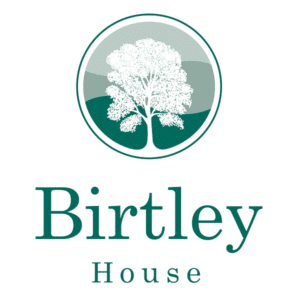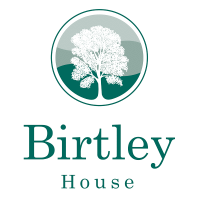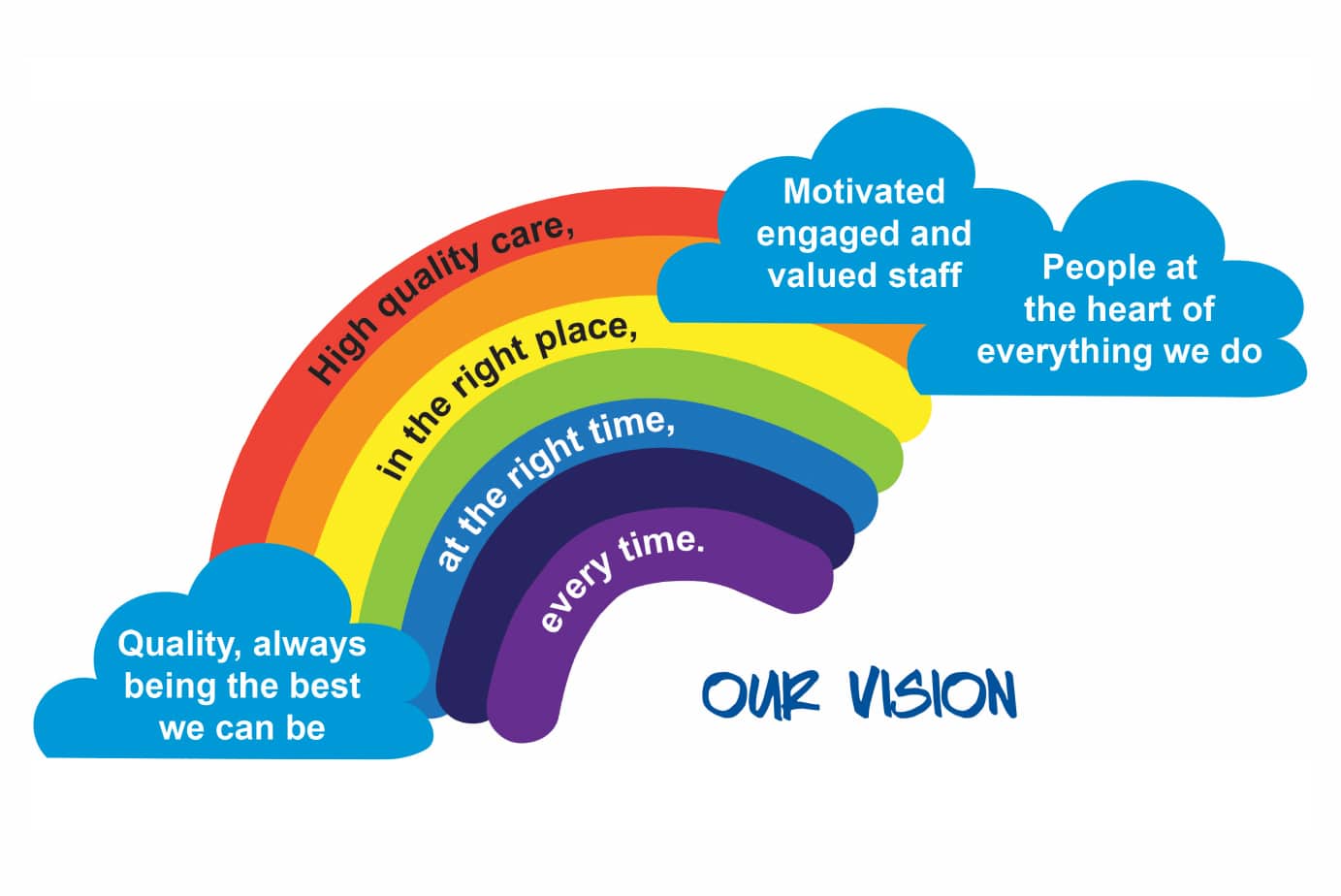Birtley House continually wishes to demonstrate to our residents and their families that we are open and receptive to new ideas and creative ways of working.
We strive for excellence and quality at Birtley, but we fully understand that there will always be areas in which we can improve and do better. The small things really do matter and our residents’ voices are paramount.
Therefore, to optimise our residents’ individual experiences here with us, we organised a formal discussion week on a series of subjects for everyone at Birtley House to participate in.
Held on the week commencing on 20th November. We enjoyed a selection of workshops, presentations, and discussions on topics ranging from the vital role of professional development to spiritual care and the importance of active listening.
Monday
Sylwia, our Registered Manager, kick-started the week with an introductory discussion on attitudes towards an increasingly ageing population in the UK and how we need to adapt our skills and knowledge to meet the challenges this brings to our society. We recognise that getting older, whilst inevitable, should not be looked at in a broad-brush way, but rather as a mixed bag of experiences, with extra years to be cherished and lived to the fullest.
Spiritual Care – What does it mean?
We are extremely fortunate to have our chaplain, Reverand Liz, on hand in a spiritual and pastoral capacity to support the spiritual needs of our residents and staff. ‘Spiritual care’ does not have to equate to any particular religion or creed but rather can be an overarching concept that looks at the whole person, their wishes and preferences, hopes and fears.
The Role of Empathy; the difference between care and caring
Our reflections on spirituality moved us along to a wider consideration as to the role of empathy in care and the difference between ‘care and caring’. When we care for someone, we take responsibility for their welfare and ensure that their needs are met. Caring is a quality or attribute that is characterised by a genuine concern for the well-being of another person. When we are caring, we demonstrate empathy, compassion, and kindness; our commitment to safeguarding our residents’ physical, emotional and psychological needs are intertwined. When we practice empathy, we reassure our residents that we have the emotional intelligence to consider the whole person and what they might be experiencing, not just what’s obvious on the surface. Trust and reassurance are key.
Tuesday
Employee professional development – the importance of staff training
Day 2 was headed by Carole, our Head of Housekeeping, who discussed the importance of staff training in health and social care. We never stop learning, nor should we become complacent in our learning, but rather strive to galvanise our skills and look to keep up to date with all the latest policies and procedures. Our mandatory training courses, both face-to-face and online, continue to be important and relevant to everything we do in our sector. Infection prevention and control continue to be particularly important as we navigate the season of coughs and colds. We need to remain open-minded about the advances in learning and be considerate of our colleagues and residents who might have different needs to ourselves.
Small things really do matter
Resident, Eileen, reminded us that ‘the small things really do matter.’ It is very important that we actively listen to our residents and respond to their needs and wants, however insignificant. When we say ‘little things’ we might mean someone sitting down next to you rather than standing over you; someone taking that extra moment to listen and allow you to express your fears. The ‘little things’ that matter to Eileen are based on communication and staff introducing themselves. We should never assume that residents will immediately recall staff members’ names even if they have conversed the day before. Therefore, she appreciates our existing practices of knocking before entering a resident’s room, announcing our names and the purpose of the visiting, alongside having our name badges prominently displayed.
Software development – meaningful ways of using data leading to improvements in outcomes and processes
Director, Tim Whalley, showed residents how we capture information about their care and how it is fed back into the electronic system to develop and enhance residents’ care plans. We looked in detail at the content of some of the forms on our care planning app, Sekoia, and the types of information we record each time care is given. Tim also showed how this information can be displayed on a dashboard which provides a summary of the most important information to nurses and management.
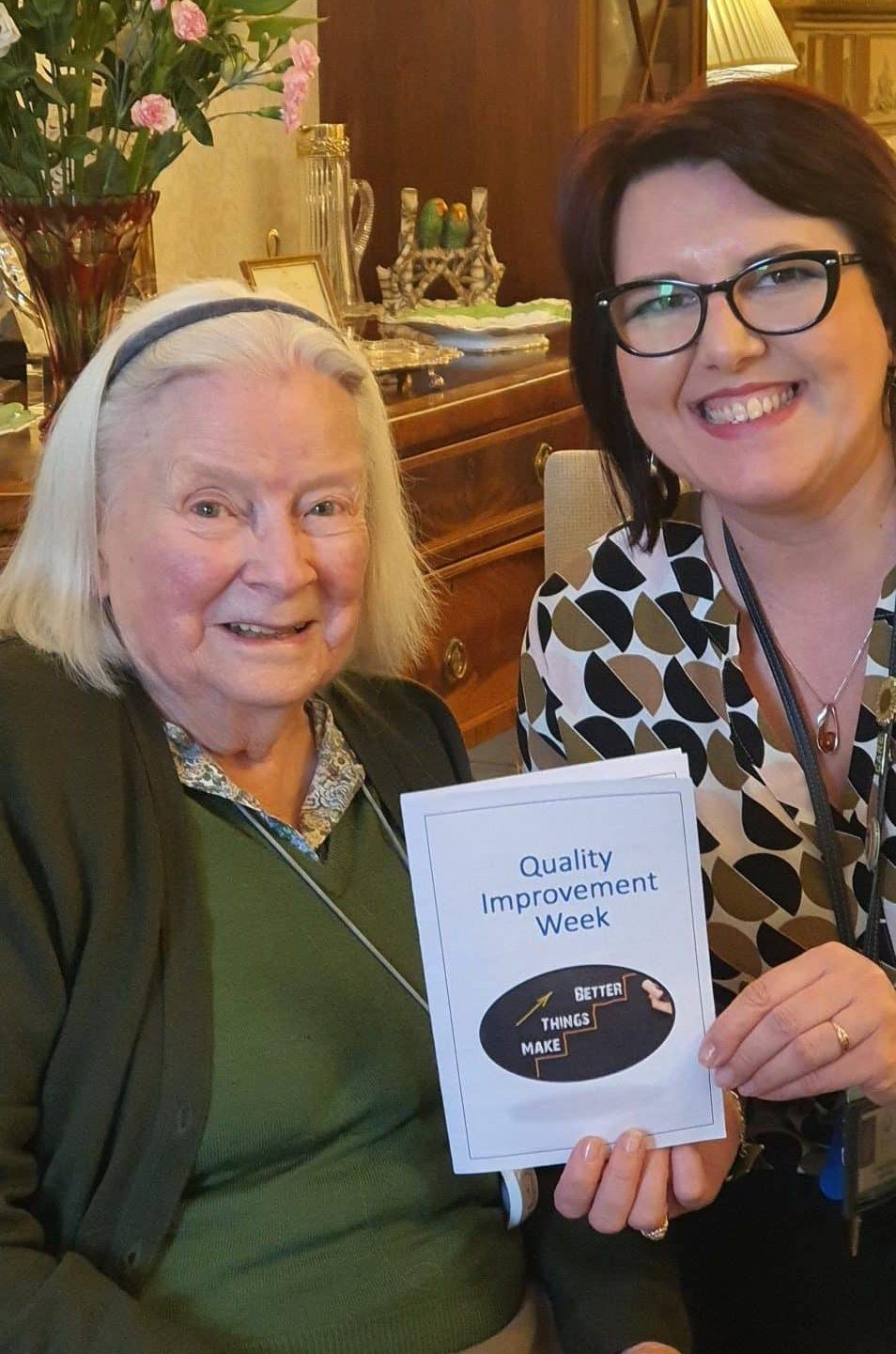


Skin integrity and pressure sore prevention in the elderly
Sylwia, our Registered Manager continued to talk about our collaboration with the tissue viability nurses (TVNs) and their ‘React to Red’ campaign which signposts all the areas at greatest risk from pressure damage. Educating the audience that this is one of the reasons we encourage movement, ensure residents are clean and dry and promote good nutrition and plenty of fluids.
Wednesday
My life as a Nurse by Bernadette
A unique insight into the life and career of Bernadette, a retired nurse and now Birtley House Nursing Home resident. It was fascinating to hear about her career and travels from her home country of Ireland, her move to Scotland and the NHS, and eventually across the Atlantic to Canada and the US and onto the islands of the Caribbean. Throughout, she managed to carry on her work as a nurse whilst adapting to the varying conditions in whichever service she found herself. It was interesting to compare NHS and non-NHS settings as well as different countries and cultures. Throughout her career and all the adventures along the way, the essence of outstanding quality caregiving shone through. The future of care looks bright thanks to the dedication of those who choose a career in care. Well done to her and all our nurses and carers for the jobs they do so well.
Reducing medication waste and polypharmacy
Sylwia, our Registered Manager, feels passionately about the topic of medication waste & polypharmacy – but what is Polypharmacy? When someone is taking multiple medications at any one time this can be clinically justified in some cases but can also occur through poor medicine management, usually called “inappropriate polypharmacy.” In England, more than 1 in 10 people aged over 65 take at least 8 different prescribed medications each week. According to a report conducted by Age UK, around 1 in 5 prescriptions for older people living at home may be inappropriate. The human and financial cost of poor medicine management in older people is colossal. The importance of regular medication reviews cannot be underestimated. It underlines the importance of a person-centered approach to ensure that the medication is doing what it should be doing and not causing adverse effects.
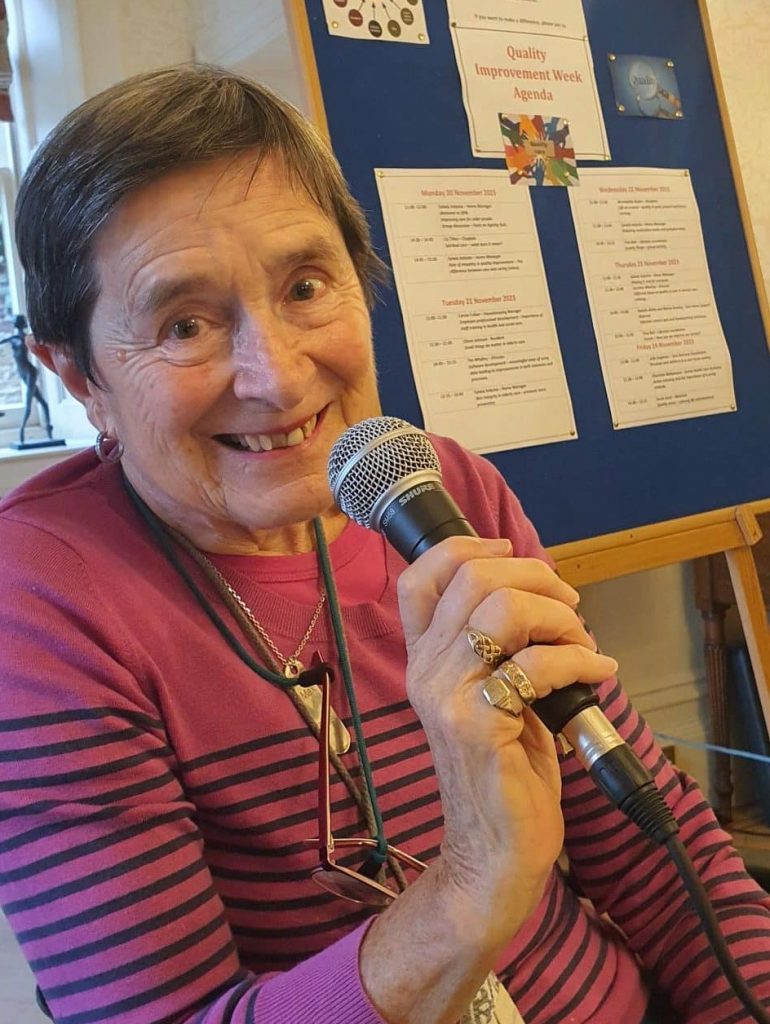
Thursday
Making it real for everyone
Another successful morning where we reflected on how we can work better in a ‘person-centered way’ and how by embracing the ‘I’ and ‘We’ statements for good care and support we can ensure that our residents are living the life they wish to live and are kept safe and well. We are confident that by living by our Birtley core values, Kindness, Integrity, Positivity, and Adaptability, we can continue to empower our residents to have the individuality, independence, privacy, dignity, respect and rights they deserve. The 2 Cs – compassion and care are the bedrock of what we try every day to do at Birtley.
Quality in care – a view from the end user
There followed an extremely engaging talk from Caroline, our Company Director on her recent experience of being cared for in an NHS setting and how this compares with our service. Caroline’s unique and personal perspective shone a spotlight on the service user experience and re-iterated what our resident, Eileen, spoke about earlier in the week, the small things do matter. At all stages of the process, the importance of looking at the individual and catering to their needs in a reassuring and caring way is paramount. Whether one is being cared for in the short term such as respite care or on a more permanent basis for their care needs, the essence of person-centered care delivery must take precedence.
Infection control and lifestyle improvements
We were delighted to welcome Community Matron Natalie who led the group in an Infection Prevention & Control quiz and hand washing awareness talk, and thanks to Tina for her open forum discussion on how we can improve our service and activities. A very engaging and informative end to the day’s discussion.
Friday
Personal care delivery in a care home setting
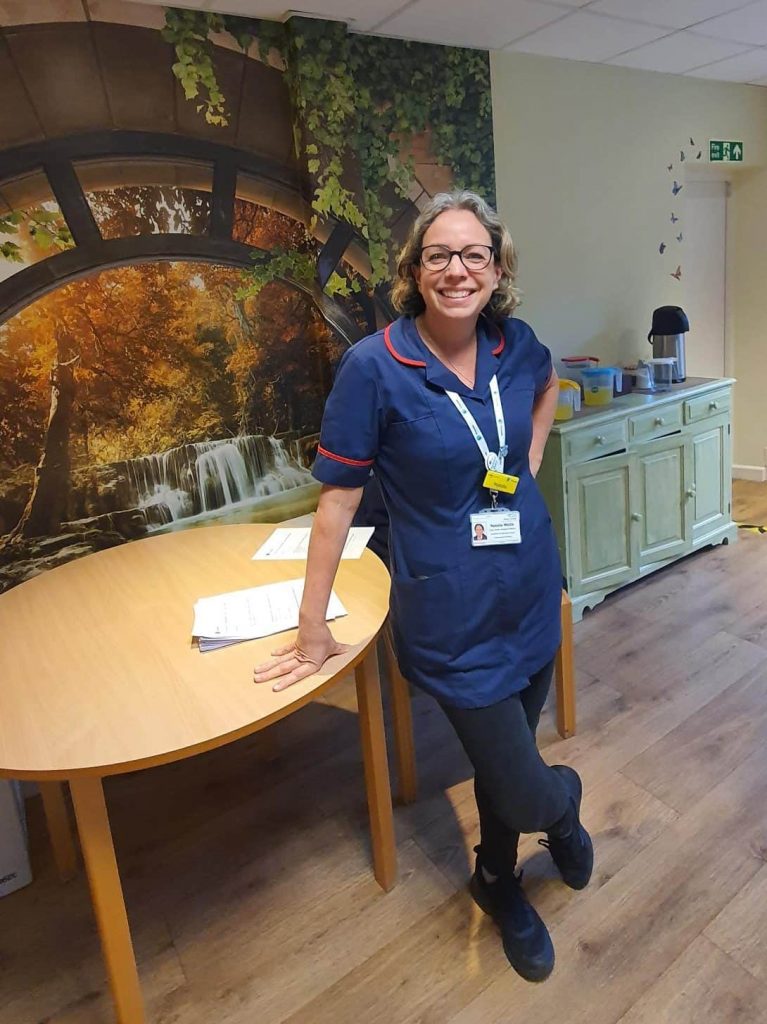
Care Delivery Co-Ordinator, Julie spoke passionately about personal care delivery and how good care practice comes through the relationship formed between carers and the individuals they care for. There should be no difference in how we care for any resident, regardless of gender. There is so much more to care about than helping with washing and dressing. The care given should be consistent with what is detailed in an individual’s care plan which will evolve over time. Dignity and respect should be always practised at every stage along with a sensitive and compassionate approach.
Active listening and the importance of a caring attitude
Carer Max continued the conversation on the importance of active listening and how it should be the cornerstone of meaningful communication. It is critical to be fully engaged with our residents so that we not only hear what they say but we understand, or at least try to, the emotions behind their words and actions. It is all about recognising everyone’s needs to ensure that we tailor the care we offer in the best possible way to support each person under our care. As Max succinctly put it: ‘An active and caring attitude are not just aspects of caregiving but the life and soul.’
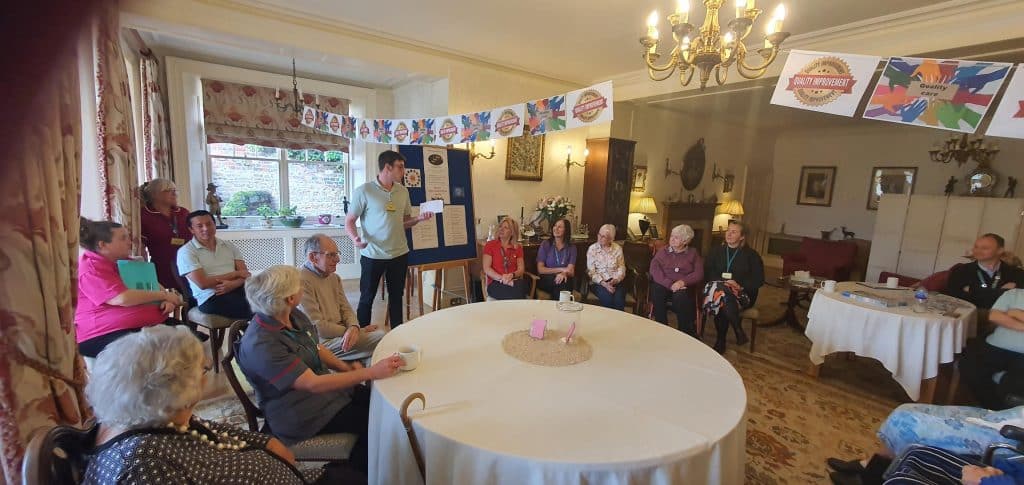
We rounded off the week with a musical extravaganza with our regular entertainer, Kevin. It was great to end the week of discussion and reflection with some feel-good vibes – medicine for the soul! All in all, it was a fun-packed and hugely insightful week for not only our Birtley team but also our wonderful residents.
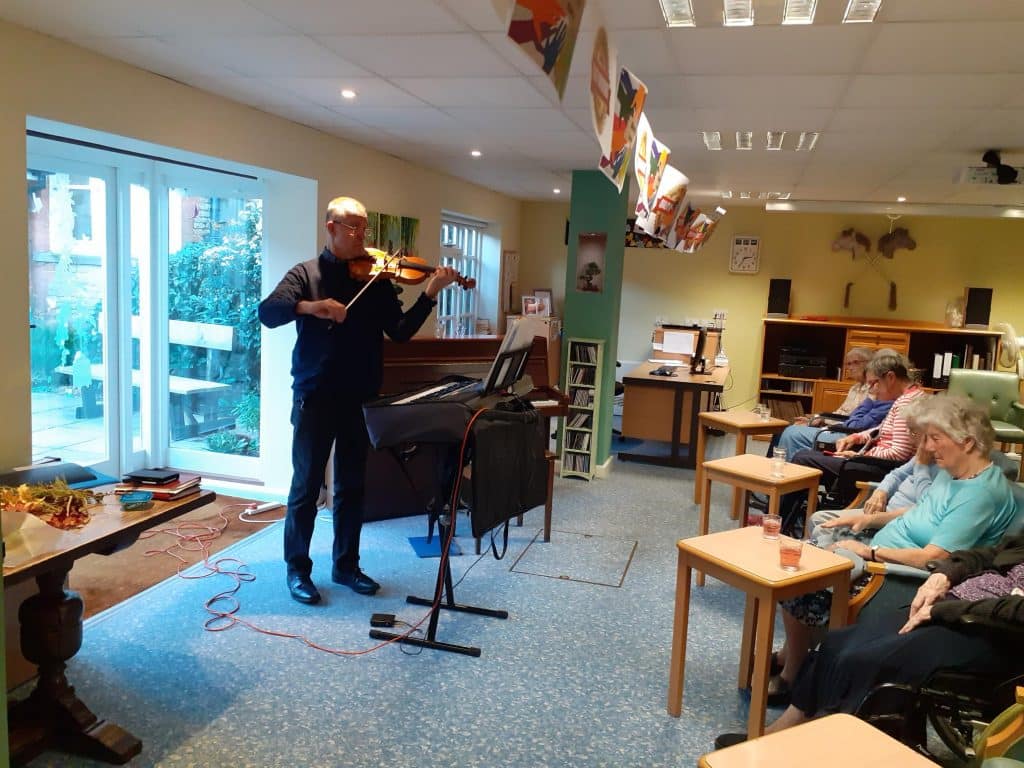
Enhancing the quality of Birtley House is a collective effort that requires a holistic approach. By prioritising the physical and emotional well-being of our residents, fostering a supportive environment where they feel seen and heard, as well as implementing engaging sessions, we can create a space where our residents truly thrive and feel at home.
We would like to thank all of those who put something forward for the discussion week – it is people like you who continue to drive the excellence we are so proud of at Birtley House.
We hope that all the topics discussed here will contribute to the ongoing innovation of Birtley House Nursing Home and play their part in continuing to deliver to highest degree of care possible, for everyone, at all times. Let’s continue striving for excellence and making a positive difference in the lives of those we look after!
Birtley House is a privately owned and family-run care home in Bramley, Guildford Surrey. Nestled in the Surrey Hills countryside, Birtley House offers residential and respite care, dementia care and nursing and residential care for up to 47 people within 48 acres of grounds. If you are interested in learning more about Birtley House Nursing Home, please call 01483 892 055 or info@birtleyhouse.co.uk
